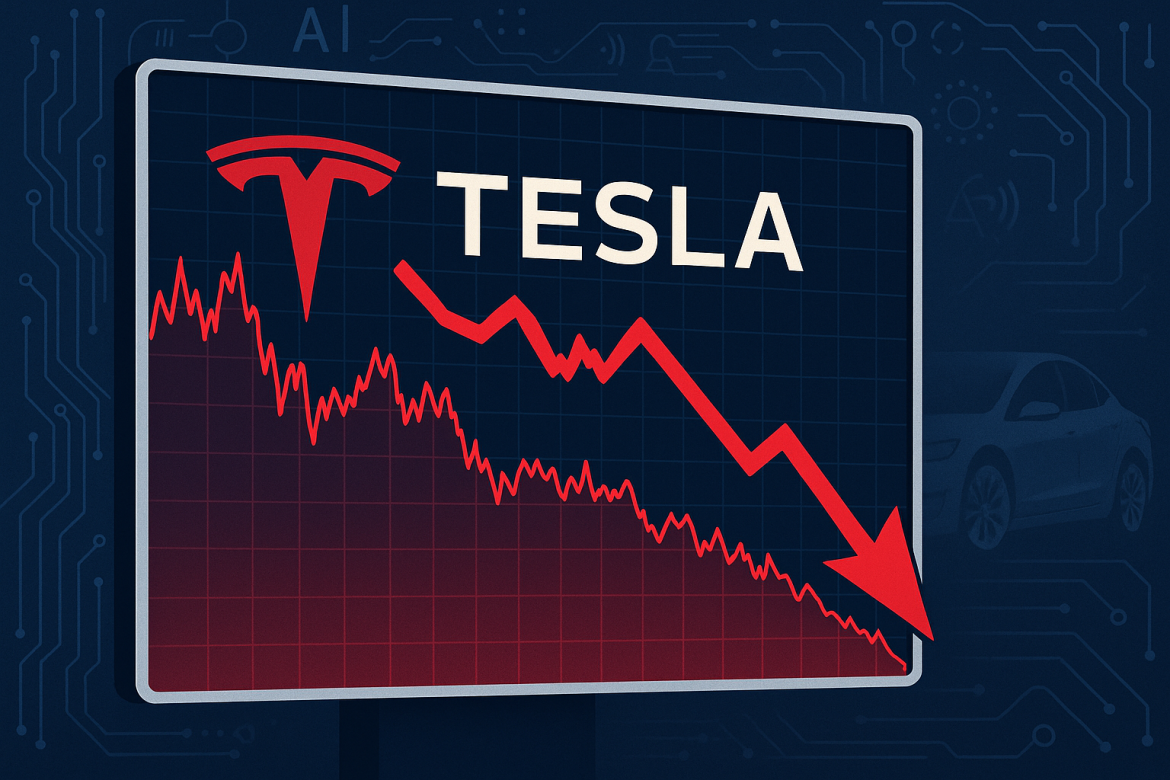Tesla stock extended its recent slide on Thursday, falling sharply after US United States Consumer Product Safety Commission (USCPSC) said the company should recall around 10,500 Powerwall 2 battery systems.
Shares of the electric vehicle maker dropped 6.2% to $403.87 in midday trading, down $26.73, making it the worst-performing stock in the Nasdaq 100, according to Dow Jones Market Data.
The broader market was also in the red, with the S&P 500 down 1.2%, the Dow Jones Industrial Average off 1%, and the Nasdaq Composite slipping 1.9%.
Tesla shares have now fallen in four of the five trading sessions since the company’s November 6 annual meeting, where CEO Elon Musk secured shareholder approval for his massive 2025 pay package.
Coming into Thursday’s session, Tesla stock had already declined 3.4% for the week.
The stock’s recent weakness follows a period of heightened volatility in both Tesla and other major technology names as investors weigh corporate developments and shifting sentiment in the artificial intelligence sector.
Recall of powerwall units raises safety concerns
Adding to the pressure on Tesla’s shares, the company announced a recall of about 10,500 units of its Powerwall 2 home battery systems in the US due to potential fire and burn hazards.
The USCPSC said the systems “may fail and overheat,” posing a risk of serious injury or death, though no injuries have been reported so far.
Tesla said it has received 22 reports of overheating linked to the affected systems, with some incidents resulting in property damage.
The issue appears to stem from specific lithium-ion battery cells that can overheat under certain conditions, potentially smoking or igniting.
The company said it is remotely limiting the charge on affected Powerwall units to reduce risk while arranging free replacements for customers.
The recall highlights Tesla’s growing exposure beyond electric vehicles as its energy-storage business becomes an increasingly important part of its long-term strategy.
Retail investors remain bullish
Despite the recent decline, Tesla continues to enjoy strong backing from retail investors.
According to JPMorgan’s Retail Radar report published on Wednesday, individual investors have purchased roughly $1.1 billion more Tesla shares than they have sold over the past week.
Retail investors, who own about 41% of Tesla’s publicly traded shares, have long been a key force in the company’s stock performance.
That figure is significantly higher than the average retail ownership across the S&P 500, which stands at roughly 5%, and well above the 25% average for other companies in the so-called “Magnificent Seven” group of tech giants.
The strong retail participation also played a crucial role in the outcome of last week’s shareholder meeting, where investors voted overwhelmingly—by about a three-to-one margin—in favor of Musk’s nearly $1 trillion pay award for 2025.
JPMorgan’s report shows Tesla remains one of the top picks among smaller investors, alongside Nvidia, Meta Platforms, AMD, CoreWeave, Oracle, and Apple, all companies deeply involved in the AI buildout across data centers and hardware infrastructure.
AI investments and market context
Tesla’s growing AI ambitions, particularly in self-driving technology and humanoid robotics, continue to attract investor attention.
However, the stock’s latest downturn comes amid broader uncertainty in the technology sector, where valuations for AI companies have reached record highs.
Elon Musk’s AI venture, xAI, recently raised $15 billion, adding to a $10 billion funding round reported in September that valued the company at $200 billion, said a CNBC report.
The report said much of the new capital will go toward acquiring GPUs, the advanced chips that power large-scale language models and AI development.
The surge in AI valuations has been widespread, with Anthropic, OpenAI, and other startups raising tens of billions of dollars in recent months.
While enthusiasm remains high, some analysts caution that the rapid pace of capital inflows could be contributing to near-term market volatility.
At Tesla’s recent meeting, shareholders also voted on a proposal to invest in xAI, with the company’s general counsel, Brandon Ehrhart, noting more votes in favor than against.
He added that Tesla is reviewing the next steps following the outcome.
Despite the short-term slide, Tesla remains one of the most actively traded and closely watched stocks in the world, supported by a deeply engaged retail investor base and its ongoing efforts to merge EV innovation with artificial intelligence.
The post Why Tesla stock plunged 6% and why is it still a retail favorite? appeared first on Invezz
